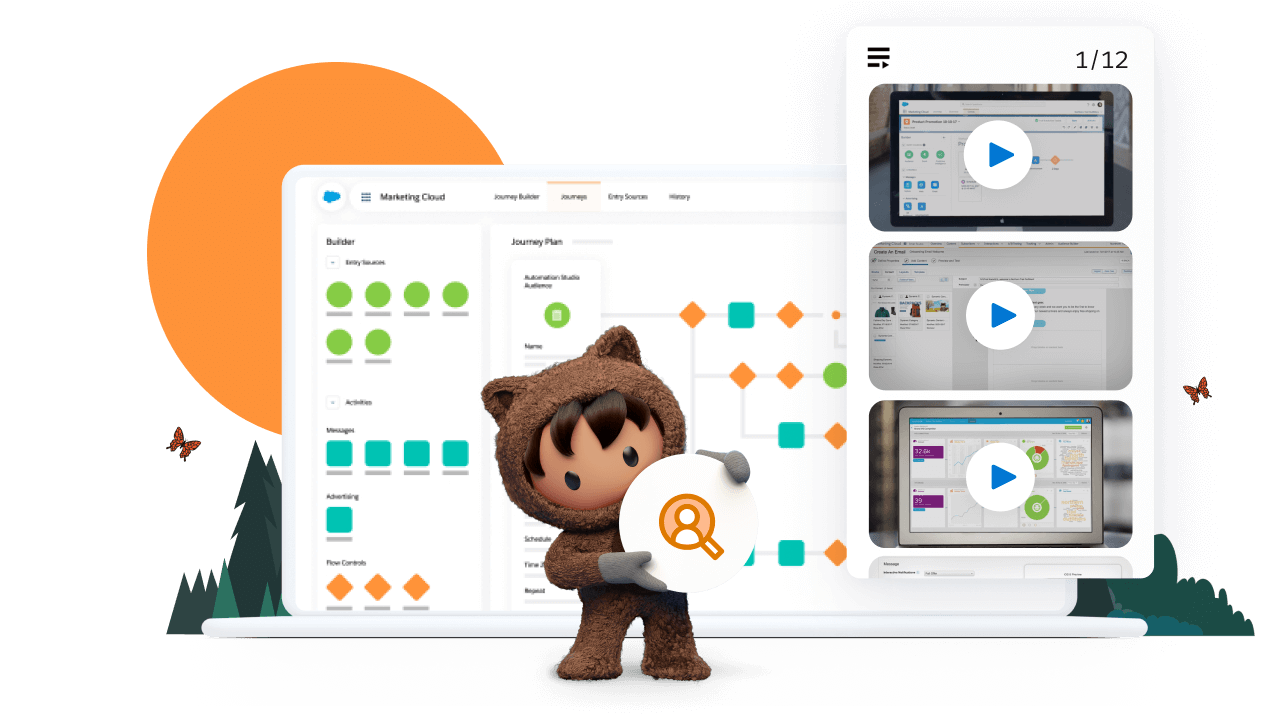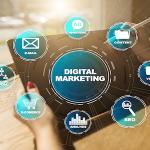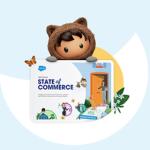When you think about marketing, what comes to mind? Everything, no doubt. From the ads you see when you’re browsing online, to the targeted posts that pop up on LinkedIn, to the flyers that drop through your letterbox.
And in today’s incredibly online world, defining what digital marketing is, is pretty tough. Because – to a certain extent – almost everything is digital. So, what advantages does digital marketing offer over traditional marketing? And how is it different from traditional marketing?
Let’s dig in.
Marketing Cloud Demo
Turn your marketing campaigns into meaningful conversations with the 1:1 customer platform.

What is digital marketing?
So, let’s break it right down. Marketing is all the combined activities that identify customers and manage relationships with them. And because customers are central to a brand’s success, so is marketing.
In a (very) simplified way, you can say that marketing has two jobs:
- To understand your customers’ concept of value, and
- To show customers the value of what your company has to offer.
And, in essence, marketing needs to position your company’s values in line with your customers. Not too much to do then, hey?
So, what is digital marketing?
If the purpose of marketing is to get in touch (and stay in touch) with customers where they are – which these days are increasingly online – then digital marketing is marketing that achieves its goals by using digital tools and channels.
But this doesn’t mean necessarily sticking online. Digital marketing works well alone, as well as in synergy with traditional marketing tools, like print ads, radio, TV, telemarketing or face-to-face marketing.
Which brings us to the next big question: what advantages does digital marketing offer over traditional marketing?
There are four key benefits of using digital marketing:
- You can achieve better outcomes. When you use digital channels, it’s possible to precisely choose the targets of your messaging, which leads to a ton of good things like higher conversion rates and high-quality contacts.
- It’s accessible, so any size business with any size budget can use it. Plus, the outcomes are more easily measured. (Which makes proving MROI easier.)
- You can engage your customers and maintain a dialogue with them across every stage of the customer journey.
- It’s flexible from both strategic and operational standpoints. If something isn’t working, it’s quick and simple to adjust what you’re doing.
Digital marketing, in practice
Now we know what digital marketing is and why it’s beneficial to use, what does it mean to put digital marketing into practice?
It means using a range of digital tactics, tools, and channels to:
- Understand the market and the demand for your business’s products or services.
- Generate, communicate, and position the value of your offerings to your customers effectively and strategically.
- Measure your outcomes.
And, to get you started, here’s a list of the different digital marketing tools, channels, and tactics you can use:
- Affiliate marketing: Promote your product or service to a third party, like sharing links that track conversions on their site, social media channels, or newsletters.
- Content marketing: Create and share blog posts, ebooks, infographics, podcasts, videos… Anything you can think of!
- Sponsored content: Bring an influencer on board to help you create blogs, videos or other kinds of content.
- Digital Analytics: Use varying tactics and tools (like internal or external analytics platforms) to monitor the metrics of websites, social media, apps, email marketing, and advertising.
- Email marketing.
- Inbound marketing: Publish high-quality, useful content on the right channels, at the right time (in terms of the stage of the customer journey), to attract customers to your company.
- Influencer marketing: Use the reputation or large audience of a popular personality in your market – think bloggers, YouTubers, and TikTokkers. The list is endless!
- Instant messaging marketing: Engage your customers with text messages or via messaging apps like WhatsApp.
- Marketing automation: Automate and optimise digital marketing campaigns conducted via email and social media.
- Social media advertising: Set up sponsored posts on Facebook, Instagram and LinkedIn feeds, or sponsored blog posts.
- Online PR (or digital PR): Engage online with journalists, customers, bloggers, and influencers. This is an advanced approach to traditional PR.
- Pay per click (PPC): Advertise through the use of social networks or via keyword advertising (Google Ads above all).
- Search engine marketing (SEM): Add SEO, keyword advertising and more to your digital tactics.
- Search engine optimisation (SEO): Create content and optimise your site for search engines, so customers find you when searching for specific queries and needs.
- Social media marketing: Use the wide breadth of social media sites to engage your audience – from different social networks to instant messaging apps, and even blogs.
For more information on digital marketing tips read our blog Digital Marketing: Where Does Your Business Stand.
Marketing Cloud Demo
Turn your marketing campaigns into meaningful conversations with the 1:1 customer platform.

























